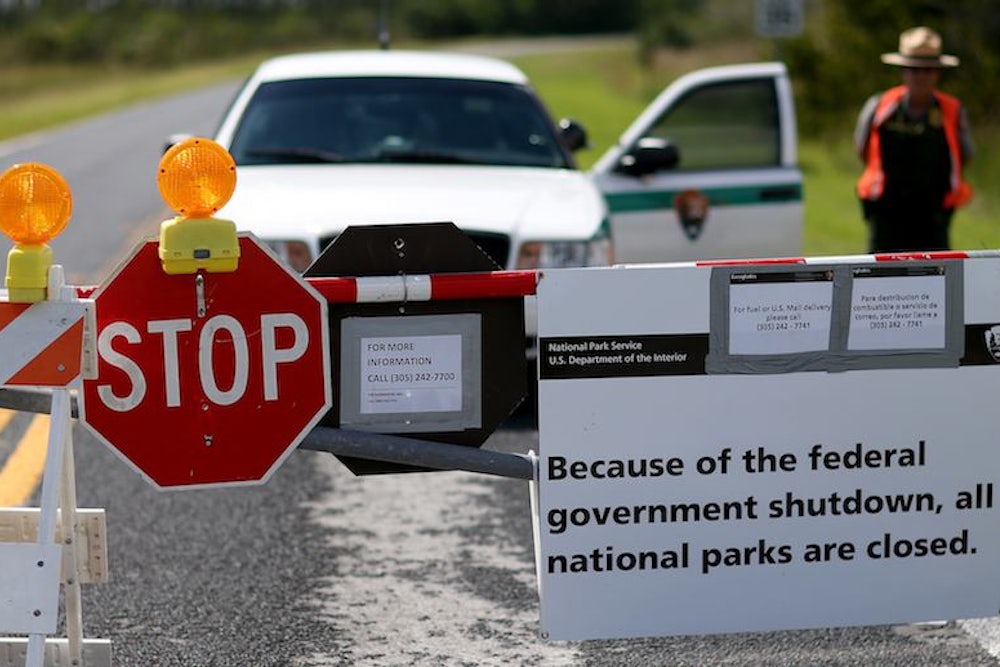On Capitol Hill, senators Harry Reid and Mitch McConnell are frantically working to negotiate a deal before the government shutdown becomes a government default. A few blocks away, in the Rayburn House Office Building, a small group of U.S. representatives is occupied with what Doc Hastings, chairman of the Natural Resources Committee, has decided is an equally pressing task: Scrutinizing every barricaded road, traffic-coned scenic view, and chained-off Porta Potty in the National Park Service’s shut-down system.
“We are living in a Kafka novel!” shouted Democratic Representative Gerry Connolly. With the government on the brink of disaster, “we’re having a hearing to pillory [National Park Services Director Jonathan] Jarvis.” He added caustically: “Imagine [the Republicans’] shock that there would be consequences—that their favorite place to picnic would be closed!”
Other Democrats on the committee are making it equally clear that if they must be cast in this political theater, they’ll play their parts with the absurdity they deserve. “Our national parks system is, surprisingly, part of our national government, which you shut down,” Representative Peter DeFazio told his Republican colleagues. “If you want to know who’s responsible, let me show you.” Then he held up a mirror and panned the room.
Since the shutdown began, the parks—and, in particular, the august memorials in Washington, D.C.—have become the right’s favorite symbol of President Obama’s mean-spiritedness. Conservative commentators took to calling the blockades on the National Mall “barry-cades,” a play on the president’s nickname. That sentiment, and Hastings’ allegations, are captured in the title of today’s hearing: “As Difficult as Possible.” The Republican caucus contends that Obama and Jarvis have blocked off public lands with as much ostentation as possible to emphasize the impact of the shutdown. In his testimony, Hastings declined to follow this circular piece of logic back around to its head, which is, of course, that if Obama can use the shutdown for leverage, it must be because it is not his fault to begin with.
Politicking aside, the Republican argument that NPS's “policies have been arbitrary” doesn’t hold water. The right’s main piece of ammunition has been the claim that open-air monuments and memorials remained open during the 1995-6 shutdown, so their closure this time around must be an intentional twist of the knife. But Denis Galvin, a former deputy director of the NPS, set the record straight. “Lincoln and Jefferson were barricaded,” he said. “The much discussed World War II Memorial did not exist then, but if it did,” it surely would have been closed off, too. As for the fact that a few parks remain open, Jarvis explained in his testimony that Secretary of the Interior Sally Jewell has worked with some state governors who are willing to fully fund their parks in the interim, and that certain spaces, including the National Mall, are treated differently because access to them is protected under the First Amendment.
This isn’t the first time the NPS and the GOP have faced off this year. When sequestration cut $110 million from the parks budget, signs appeared warning of “Operational Change Due to Sequestration.” Republican Representatives Darrell Issa and Mark Meadows sent Jewell an angry letter calling the signs “another tactic used by the administration to politicize sequestration” and demanding to know how much they had cost.
Greg Bryan, mayor of the town of Tusayan, Arizona, which borders the Grand Canyon, revealed the folly of the proceedings when he tried to defend them, saying, “We need to find different ways of doing this.” He urged a discussion of “better policies” to govern parks in shutdowns in the future. In the future, let’s hope we don’t defund our entire government for 16 days and counting. Whether or not the parks service did a flawless job implementing the shutdown (after furloughing over 20,000 of its roughly 23,000 employees), only in a funhouse-mirror version of reality should members of Congress be debating the functions of an agency that accounts for .0006 percent of the federal budget on the day before we may default on our national debt. Come tomorrow, Hastings et al. may still be sitting in Rayburn, arguing about a tiny historic property in Virginia, when we go over the cliff.
